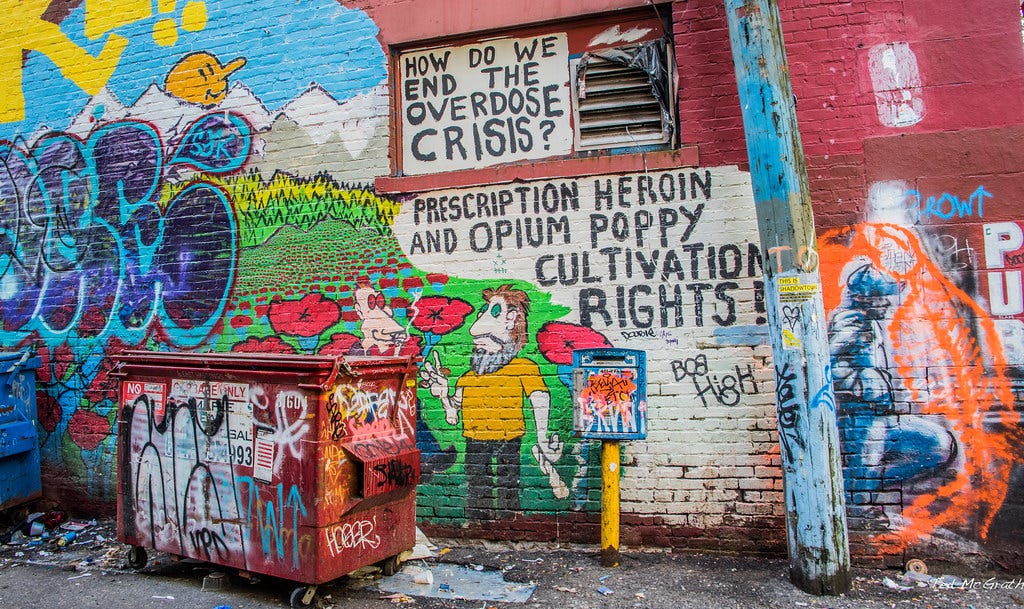How much worse has the opioid crisis in Canada gotten since the pandemic began?
And what is the federal government doing about it?
Hey there, and welcome to the 16th issue of The Supplement, a newsletter that fills in the gaps of your other news intake. This is Sam, one-third of the Supplement team!
Each week, we pick a question submitted by you, our readers. If you’d like to submit a question for a future week — it can seriously be about anything — then email us at thesupplementnewsletter@gmail.com.
Help us get to 1,000 followers on Instagram!
This week, we’re tackling this question: How much worse has the opioid crisis in Canada gotten since the pandemic began?
TL;DR:
Fuelled by social isolation, border restrictions, and disruptions to the drug supply chain brought on by the pandemic, deaths by opioid overdose are rising across the country. Experts say that an approach that de-emphasizes criminalization and prioritizes health-based interventions is sorely needed to actually help people who use drugs.
You might have heard about the “twin epidemics” in Canada. That refers to COVID-19, of course, and another public health emergency that is devastating families across the country: the opioid crisis.
The opioid crisis has been ongoing for years — but officially, BC declared a public health emergency in 2016. The death toll has been steadily rising since then, and the pandemic has only worsened it.
This isn’t just a west-coast problem. Alberta and Ontario have also been hit hard — and in the first half of 2020, 86 per cent of all opioid overdose deaths took place in those three provinces.
Alexandra Harvey took a zoomed-out look at the issue for The Walrus that is absolutely worth a read. She explains that “border restrictions, lockdowns, and social distancing have disrupted the drug supply chain, forced people to use drugs in isolation, and limited people’s access to harm-reduction services.” The drug supply actually became more dangerous once the Canadian border closed.
As Harvey wrote, “Efforts to stem one health crisis have exacerbated another, and in failing to consider drug users in its COVID-19 response, the government has put them at increased risk.”
For a more personal read, The Globe and Mail’s Marcus Gee followed up with Angelica Helpard, the first user to share her story with him as he sought to understand opioid addiction’s toll on Canadians in 2018, about how she has been affected by the pandemic.
Last October, more data was published about the scale of the opioid problem. However, Ontario is reportedly experiencing a recent rise in stimulant-related deaths — and little attention is paid to stimulants, which include substances like crystal meth.
Experts are increasingly favouring a “health-focused” approach. This means prioritizing health interventions and ending criminality-focused responses like arrests and seizures for the possession of small amounts of drugs. Supervised injection sites, addiction counselling, and needle-exchange programs all fall under that umbrella, but COVID-19 restrictions like Quebec’s curfew have limited access to them.
Vancouver remains on the front lines of this conversation. After Vancouver City Council supported the move in November, the federal government agreed yesterday to begin discussions about decriminalizing drug possession for the city.

Will what’s happening in Vancouver turn into a national blueprint for addressing the crisis? Over the summer, Chief Health Officer Teresa Tam also suggested decriminalizing hard drugs, but Health Minister Patty Hajdu insisted it wouldn’t be a “silver bullet” solution.
The Liberal government has taken other steps: for example, instructing federal prosecutors to prosecute only the most serious drug possession offences. They have a webpage where you can see the action they’ve taken on opioids to date.
But advocates have already expressed concern about 2021.
If you’re looking to dive deeper, you can’t do much better than Crackdown, a monthly podcast about the drug war led by drug user activists and supported by research. More reporters diligently following this beat include The Globe and Mail’s Andrea Woo, the Saskatoon StarPhoenix’s Zak Vescera, and Ricochet Media’s reporting partner Christopher Curtis.
Here’s someone to follow: For anyone who has been following what might be the most dramatic, late-stage-capitalism-incarnate, *Canadian* story this week, this recommendation might not come as a surprise: Jackie Hong. This CBC Yukon reporter broke the story of a wealthy BC couple who flouted travel restrictions to go to Yukon and get the vaccine. Haley Ritchie, politics reporter for Yukon News, revealed the couple’s names in a subsequent report.

Here’s a story to check out: I’m excited to listen to a new podcast by The Conversation’s Vinita Srivastava. Don’t Call Me Resilient, a new six-episode podcast about race and racism that will explore critical issues through conversations with academics and activists, launches Feb. 3. It promises to be “intimate, authentic and at times, uncomfortable” and delve into potential solutions — sounds like exactly the kind of media we need right now.





